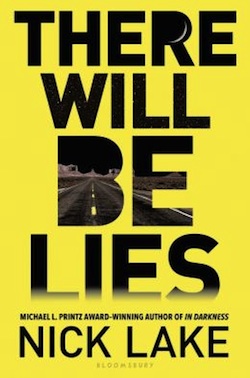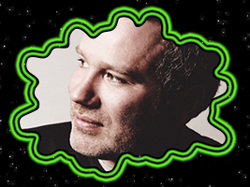Welcome back to The Pop Quiz at the End of the Universe, a recurring series here on Tor.com featuring some of our favorite science fiction and fantasy authors, artists, and others!
Today we’re joined by Nick Lake, an expert on blood ninjas and a children’s book editor for Harper UK. His new book There Will Be Lies is out this week from Bloomsbury.
Nick Lake promises he isn’t the son of Ricki Lake (or IS HE?), but he might be the target of a Navajo rain god. Both of these things have perfectly reasonable explanations.
Please relate one fact about yourself that has never appeared anywhere else in print or on the Internet.
Okay, so this isn’t going to paint me in the best light. But it does tie in with the theme of lying in There Will be Lies. Here it is: when I was at college I convinced a girl that Ricki Lake was my mother. This was not true. For one thing, I’m British, and Ricki Lake is obviously not. I can’t remember why I did it; I suspect a friend bet me that I couldn’t do it, because of that precise difference of nationality, and I was like, “YES I CAN.” I didn’t know the girl—she was from another course, at a party. And I wasn’t hitting on her, or anything, I just told her that Ricki Lake was my mother, probably a propos of something but I can’t remember what, I mean I didn’t just walk up to her and say, “Hey, Ricki Lake is my mother”… But anyway, then I invented this whole elaborate story to justify my accent. Ricki Lake, I said, was married to my father, who was British, but they had gone through an acrimonious divorce after my sister and I were born, mostly because she had been offered this daytime TV job in the US, and she had ended up leaving us in the UK and returning to America to work. The big finale to this story, as I spun it, was that, years later, we had come to forgive Ricki, and so my sister, my father and I would sit and watch the show, on daytime TV in Britain, and chant “Go Ricki, go Ricki” along with the audience… but even though we did that, we never called her, and so she didn’t know that we were joining in with the chant.
The girl cried at that bit and I felt really, really bad. There was just no reason for making any of this up, though I do remember it as a moment where I realized that I could tell stories, so it was perhaps a pivotal, if really screwed-up, turning point for me personally. I still feel guilty about it to this day, though, because what was the point? Now, of course, the girl would just take out her iPhone and find out straightaway that it was true, but you couldn’t do that then. There’s probably a woman, about my age, out there someone who thinks that she met Ricki Lake’s son.
What is your favorite short story?
I don’t know that I have an all-time favourite, and I’m not a big short story reader at all, but George Saunders’ “Sticks” is probably the best I’ve read recently—so clever, so symbolic, so richly visual, so devastating. And the one that has lingered in my mind the most, in the last few years, is “20th Century Ghost,” by Joe Hill, which has one of the most gut-punchingly poignant endings I have read.
Do you have a favorite underrated/unknown/under-read author?
Maybe not an author per se—I’ve struggled with some of his other books—but I think John Crowley’s Little, Big is a masterpiece that should be read by everyone, a huge book in every sense of the word about love, memory, storytelling and the dimly-sensed truth behind what fairytales, and fairies themselves, mean.
Do you have a favorite word/phrase/etymology?
I am a very big fan of the word “unheimlich,” which means “uncanny” in German and literally translates as “un-homely.” It so precisely captures a meaning—that which is spooky and creepy is that which invades the home. I also like that in French the verb for putting money into a bank account is “verser,” or pour, because I have always felt in a totally vague way that I can’t possibly substantiate or back up that money is a liquid. It pools in certain places and around certain people.
Strangest thing you’ve learned while researching a book?
 This isn’t what you mean, but I’m going to twist the question to fit the answer—a really weird thing that happened with There Will Be Lies was that I made Coyote, who is a character in the book who takes the main character out of her real world drama at certain points and into the world of the Dreaming, in control of making it rain. And it was only months afterwards that I read somewhere that in Navajo myth, which is the tribe most associated with the part of Arizona where the book is set along with the Yavapai, Coyote really does have power over the rain. That was spooky.
This isn’t what you mean, but I’m going to twist the question to fit the answer—a really weird thing that happened with There Will Be Lies was that I made Coyote, who is a character in the book who takes the main character out of her real world drama at certain points and into the world of the Dreaming, in control of making it rain. And it was only months afterwards that I read somewhere that in Navajo myth, which is the tribe most associated with the part of Arizona where the book is set along with the Yavapai, Coyote really does have power over the rain. That was spooky.
If you could name a planet after anyone (other than yourself), who would you choose and why?
I’d call it “Medecins sans Frontieres” because I think those people are heroes. Bit of a strange name for a planet though.
If you had to choose one band or artist to provide the official soundtrack to your (new/last/latest) book, who would it be?
For There Will Be Lies it would probably be the producer Clams Casino because I feel like he’d be able to bridge the sound landscape between the real life elements of the book—road journey across Arizona being pursued by various forces—and the mythic Dreaming elements. Sonically, he could do neon-soaked motel parking lots with SWAT teams pointing their guns at a room door, but he could also do a girl riding an elk across a prairie, under the stars.
For the book I’m writing now, Whisper to Me, which deals with hearing voices, a serial killer, mental illness in general, and is also a love story, I’d have to go with iloveMakonnen because he’d nail that off-kilter, troubled, but also beautiful vibe.
What’s your favorite sandwich?
Not really a sandwich but a hotdog from Papaya King in New York is a thing of wonder and beauty. I briefly lived over there and one of the things I miss the most about NY is those bloody hotdogs. There’s a film, I can’t remember which, where the big ending—it’s a romantic comedy—involves one of the characters having hotdogs couriered to their loved one from New York to Los Angeles. Anyone? Well, I mention this because I have seriously thought about trying to do the same from New York to London.
What literary or film science fiction technology do you wish existed in our world right now?
Everyone says Hoverboards, presumably? Hoverboards, hoverboards, hoverboards. Here is how ridiculous I am: when I was a kid I always wanted to skateboard, but I didn’t really have anyone nearby who wanted to as well—I lived in a little village in the countryside in Luxembourg—and I didn’t know how to learn in the days before youtube videos, so it never really happened. I did have a friend who was into bikes, so we spent a lot of time BMX-ing and mountain-biking, but I always regretted not skateboarding and so when I was 34 I decided that I would buy a board and learn to do an Ollie before I was 35. I turned 35 a few months ago and I can just about pop a small Ollie, but it’s taken like a year and a half and I’m still turning to the right and it’s all a disaster, but I don’t seem to be giving up.
Yes I am that sad.
And… what was the point? Oh yes. A hoverboard would be easier.
What was your gateway to SF/Fantasy, as a child or young adult?
I lived in a place that didn’t really have a bookstore and most of the stuff I read was from my parents’ bookshelves. I picked up the Gormenghast trilogy when I must have been about 12 and it just blew my mind, with its richly imagined quasi-medieval castle-world. The book and the castle almost echo each other in their structure—vast, sprawling, and full of decorative Gothic crenellations and little side-passages. It was a world I wanted to be lost in.
Having finally established communication with a distant alien species, what’s the first thing that we should tell them about Earth/humans?
Oh, gosh. Maybe that the way to understand us is to read and watch our stories, rather than to look at our history. To see that we are driven by connection and love, even though we sometimes get it wrong.
If you could find one previously undiscovered book by a non-living author, who would it be? Why?
George Eliot, because even though I found Daniel Deronda a little dull, Middlemarch is quite toweringly my favourite book ever and dwarfs all other novels. An undiscovered book that was only half as good would be extraordinary.
Which language, real or fictional, would you like the ability to speak fluently? Who would you talk to?
At the risk of sounding childish, I’d like to be able to speak to dolphins. I would use this ability, obviously, to speak to dolphins.
What’s your favorite fairy tale, or fairy tale retelling?
I don’t know if it counts but I love Oscar Wilde’s fin de siècle fairy tales. Particularly “The Selfish Giant.” It was, for a long time, along with his other stories for children, dismissed as sentimental and simplistic. But we live in an age much kinder to children’s literature, and even if it is a tiny bit sentimental, I don’t care. I won’t repeat the plot, so if you don’t know it, go and read it, but it’s an impossibly beautiful story. The imagery—the constant winter that prefigured Narnia by decades, the wall, the tree, the giant, the blossom—is as powerful and lingering as any in older myth or fairytale, and the ending, even though I’m not at all Christian, is phenomenally moving. I suspect Suzanne Collins had it in the back of her mind when she was writing the scene where Katniss covers Rue’s body with flowers. It has the quality of the greatest writing for young children, which is that it encapsulates several deep truths in a way that can only be expressed through story. Jeanette Winterson reviewed a recent reissue of the stories, and she said, “When a child reads of a Nightingale who bleeds her song into a rose for love’s sake, or of a Selfish Giant who puts a wall round life… the child knows at once both the mystery and truth of such stories.”In essence it’s a story about kindness, which is something that children find very obvious and adults sometimes find a little difficult.










